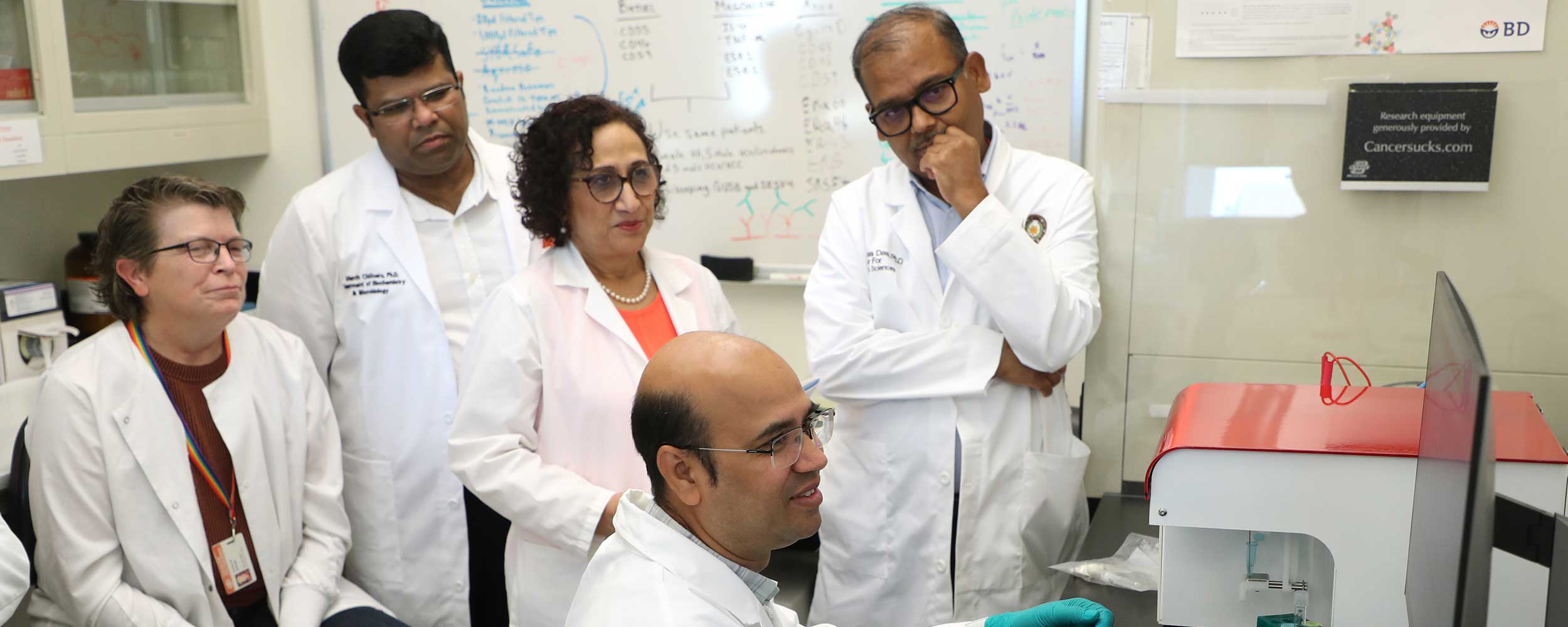
Cancer Sucks donation helping train OSU-CHS students in flow cytometry
Wednesday, October 29, 2025
Media Contact: Kayley Spielbusch | Digital Communications Specialist | 918-561-5759 | kspielb@okstate.edu
The immune system and its responses are the backbone of medicine and health, according to Rashmi Kaul, a professor of immunology in the School of Biomedical Sciences at Oklahoma State University Center for Health Sciences.
That’s why her research is dedicated to examining immune response and disease susceptibility in men and women, specifically in the liver.
Kaul’s lab examines liver disease caused by the hepatitis C virus in males versus females. Her team’s research discovered men’s clearance of the virus is compromised even with treatment due to an increase in estrogen receptors in the liver, leading to the development of fibrosis, cirrhosis and ultimately, cancer.
Kaul explained how the disease and cancer development are tied to estrogen receptors.
“Estrogen is important in inducing the protective immune responses. Our lab was the first to demonstrate that estrogen receptors differ between males and females in the liver. It even differs in pre-menopausal and post-menopausal women,” Kaul said. “We are looking at organ-specific immunity and how it is compromised or regulated by these receptors.”
One of the most important tools Kaul utilizes for this research is a flow cytometer, a laboratory tool used to analyze and characterize single cells and their protein expression at various levels.
“It’s a very important tool in immunology,” Kaul said. “You can determine the cell cycle status, do gene expression, microbial analysis and any number of techniques. It is the future, but people shy away from it because there are not enough training workshops in the United States.”
That’s why, for 20 years, she has been introducing students to this technology through Flow Cytometry Workshops.
Initially, she began with introductory courses for high school and undergraduate students in the community. However, this past year, she hosted the first hands-on workshop for OSU-CHS biomedical sciences students.
“The goal was that the students who attended the workshop could come and work with a flow cytometer in my lab to develop cutting-edge data for their papers, grants and any discoveries they wanted to make,” Kaul said.
The workshop was hosted in conjunction with Hemant Agrawal, the director of Flowcytometry Solutions in India, and a leading flow cytometrist who gives workshops around the world.
Students who attended the workshop spent two and a half days attending lectures and working with the machines in the lab. At the end, each participant received a certificate verifying their participation and qualification.
"Cancer Sucks Inc. has been the backbone of this workshop. Their support has helped
me get and train these future scientists in my lab. A lot of my medical students have
chosen to become oncologists from their cancer research here."
The workshop was funded by Cancer Sucks Inc., a nonprofit founded by Rick Horton in 1998 in honor of his mother, Donna Holland White, who died from cancer in 1996. The organization is run by volunteers who have been touched by cancer and focuses on raising money for cancer research.
Kaul credits Cancer Sucks Inc. and Horton’s investment in her research with making the workshop possible.
“Cancer Sucks Inc. has been the backbone of this workshop. Their support has helped me get and train these future scientists in my lab. A lot of my medical students have chosen to become oncologists from their cancer research here,” Kaul said.
Thanks to the organization’s support, Kaul was able to offer the workshop for free, whereas other flow cytometry workshops cost at least $1,000 per person.
In addition to several flow cytometer machines, she has had a real-time polymerase chain reaction or PCR machine and an immunofluorescent microscope funded by Cancer Sucks Inc.
Kaul said providing learning and training opportunities like the Flow Cytometry Workshop is not only important for graduate students’ professional development, but also to generate interest in the STEM field.
“People are shying away from STEM right now because they believe there is not enough funding or jobs, but it’s not true. We still need medicine. We still need to know cures and novel biomarkers. We must attract young minds towards science and make them passionate about it, because they are the future,” she said.
Kaul aims to keep offering the workshop to OSU-CHS graduate students, as well as to reintroduce it to high school and undergraduate students in the community.
For more information on Cancer Sucks Inc. and its initiatives, visit the website.
